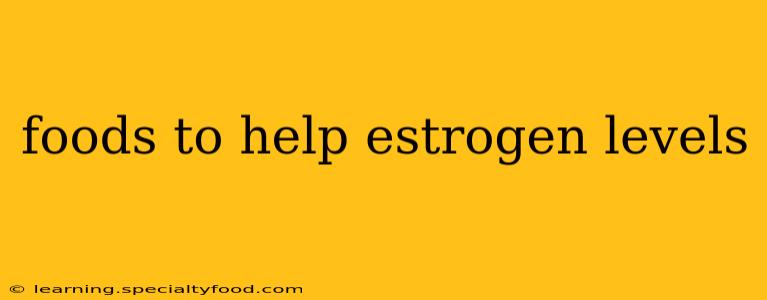Estrogen, a crucial hormone for women's health, plays a vital role in reproductive health, bone density, and cardiovascular function. Fluctuations in estrogen levels can lead to various symptoms, prompting many women to seek natural ways to manage them. While medical intervention is necessary in some cases, incorporating certain foods into your diet can contribute to balanced estrogen levels. This article explores foods that can help support healthy estrogen production, addressing common questions and concerns.
What Foods Naturally Increase Estrogen?
Many plant-based foods contain phytoestrogens, compounds that mimic the effects of estrogen in the body. These aren't identical to estrogen produced by the ovaries, but they can have similar effects, binding to estrogen receptors and influencing hormone activity. Crucially, it's important to remember that no food can replace medical treatment if you have a diagnosed estrogen deficiency or imbalance. Always consult with your doctor or a qualified healthcare professional before making significant dietary changes, especially if you're experiencing symptoms related to hormone fluctuations.
Here are some key food groups and examples known to be rich in phytoestrogens:
-
Soy Products: Soybeans, tofu, edamame, and tempeh are excellent sources of isoflavones, a type of phytoestrogen. These foods have been extensively studied for their potential impact on estrogen levels and menopausal symptoms.
-
Flaxseeds: These tiny seeds are nutritional powerhouses, packed with lignans, another type of phytoestrogen. Ground flaxseeds are easier for your body to digest and absorb than whole seeds.
-
Whole Grains: Oats, barley, and rye contain small amounts of phytoestrogens. Including these grains in your diet as part of a balanced approach can contribute to overall health and well-being.
-
Fruits and Vegetables: Certain fruits and vegetables, including apples, berries, carrots, and pomegranates, contain phytoestrogens. A diverse intake of colorful fruits and vegetables is always recommended for overall health.
-
Legumes: Chickpeas, lentils, and beans are good sources of phytoestrogens and offer other health benefits like fiber and protein.
Can Diet Really Affect Estrogen Levels?
Yes, diet plays a significant role in influencing estrogen levels, albeit indirectly. While you can't directly increase estrogen production through diet alone, consuming foods rich in phytoestrogens can help to modulate estrogen activity in the body. This can be particularly beneficial during perimenopause and menopause, when estrogen production naturally declines. Moreover, a healthy diet supports overall hormonal balance, contributing to better overall health.
What are the Best Foods to Eat for Hormone Balance?
The best approach to hormonal balance isn't about focusing on single foods but rather adopting a holistic dietary pattern. Prioritize whole, unprocessed foods, including:
- Fruits and vegetables: A rainbow of colors ensures a wide variety of vitamins, minerals, and antioxidants.
- Lean proteins: Chicken, fish, beans, and lentils provide essential amino acids for hormone production.
- Healthy fats: Avocados, nuts, and olive oil support hormone production and overall health.
- Whole grains: Provide fiber and complex carbohydrates for sustained energy levels.
Limiting processed foods, sugary drinks, and excessive alcohol consumption is also crucial for maintaining hormonal balance.
Are there any foods to avoid if you want to balance estrogen?
While there aren't specific foods that dramatically lower estrogen, limiting certain foods can support hormone balance. These include:
- High-fat dairy products: Some studies suggest a link between high-fat dairy and increased estrogen levels in certain individuals. Moderation is key.
- Alcohol: Excessive alcohol consumption can disrupt hormone balance.
- Processed foods and added sugars: These contribute to inflammation and weight gain, which can indirectly affect hormone levels.
What about supplements to increase estrogen?
While some supplements claim to boost estrogen levels, it’s crucial to consult with your doctor before using them. They can assess your individual needs and determine if supplementation is appropriate and safe for you. Self-treating hormone imbalances can be risky, so always prioritize professional medical advice.
Conclusion
Maintaining healthy estrogen levels is crucial for women's well-being. While diet alone cannot replace medical treatment for hormonal imbalances, incorporating foods rich in phytoestrogens and adopting a healthy eating pattern can contribute to overall hormonal balance. Remember to consult your doctor or a registered dietitian for personalized advice on managing your hormone levels and dietary needs. A balanced diet, regular exercise, and stress management are all integral parts of maintaining overall health and well-being.
